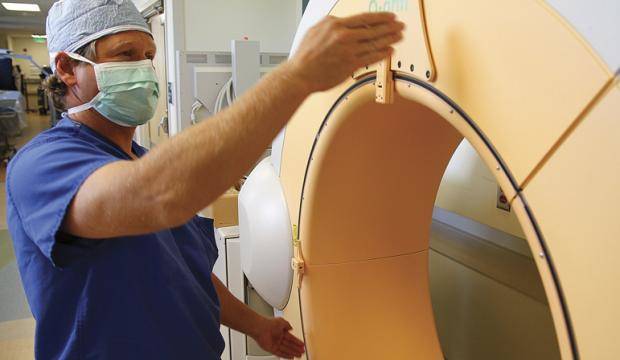A Soldotna physician will step into the leading role on the Alaska Medical Board.
Dr. Craig Humphreys, an orthopedic spine surgeon at Kenai Spine in Soldotna, was recently elected president of Alaska’s medical board, which oversees the licensing and regulation of doctors in the state. It’s his fourth year on the board and first year as president.
As president, he’ll lead the meetings reviewing new applications for medical providers and renewing licenses, considering investigations and working on new regulations for licensees. Prepping for the meetings can be arduous — before each quarterly meeting, board members receive a packet of about 1,500-2,000 pages to review, he said.
“It’s a lot of information, and you basically need to know it all when you’re the chair,” he said. “That’s not to say that it’s all on you because you have people helping.”
Humphreys practices in Soldotna and Anchorage, with the Soldotna clinic housed in the bottom floor of Central Peninsula Hospital’s Specialty Clinics Building. He works with a variety of patients, some who need surgery and others who don’t. He grew up in Alaska on a homestead in the upper Matanuska-Susitna Valley and went to the Lower 48 to go to medical school and work before returning to Alaska to practice in 2011.
He was the first physician in Central Peninsula Hospital’s then-fledgling spine program.
“I practice in Anchorage and here, I grew up and went to Dimond (High School) … but I never thought I’d do spine surgery here,” he said. “It just seemed like the community grew and the hospital grew.”
Serving on the medical board is one way of giving back to Alaska, he said. He is one of eight members from around the state, and one of five physicians. The other three seats are reserved for a Physician Assistant and two members of the public. The current members hail from most regions of the state — Fairbanks, Palmer, Dillingham, Nome, Douglas, Juneau and Bird Creek, with Humphreys representing the peninsula.
When he first interviewed for the position, he said he remembered being struck by the variety of regions candidates represented and the viewpoints they could bring to the board. That is one of the benefits to the representative board, especially with the medical industry changing as rapidly as it is with the increased scrutiny on opioid prescriptions and the proliferation of telemedicine providers around the state.
“You really get the insight on what’s happening and issues everywhere,” Humphreys said. “And there’s more of it than you probably recognize. Telemedicine (is) coming into play — there’s tons of applications.”
The opioid issue is a major one across the state. The Medical Board is tasked with investigating complaints against licensed doctors and has taken action to suspend or revoke the licenses of those found to be improperly prescribing controlled substances before. The board has also chosen not to issue licenses because of concerns about a license applicant’s history, Humphreys said.
The atmosphere is collaborative, even on some of the tougher issues, and the board tries to take care not to take swift actions, he said. The physicians on the board represent a variety of viewpoints, and it’s helpful to have someone who has a surgeon’s viewpoint on the board to complement others’ knowledge, he said.
“We’ve wrestled with abortion issues, we’ve wrestled with opioids,” he said. “It does get heated — at times I think it may blow apart. I’ve been really proud of the way people have come together and compromised … sometimes I wish we’d see more of that in our governments. People give a little bit and you try to come up with the best choice because it’s rarely black and white.”
The board is largely procedural, reviewing licenses and making adjustments to regulations, but it can take some steps to help reform the troubled health care industry. Taking steps to ensure that doctors who don’t meet ethical standards is one, and can be controversial, though Humphreys said he isn’t afraid to take the heat if the action is justified.
“You deal with hard things, and I don’t think anybody could (be president) for a long while, but I think if you don’t have people who kind of know about it, but I think once in awhile you need people who take a stand,” he said. “Sometimes you have to kind of just do what’s right. Sometimes it’s unclear, but hopefully it puts you in a position to make a difference in a positive way.”
Reach Elizabeth Earl at elizabeth.earl@peninsulaclarion.com.

